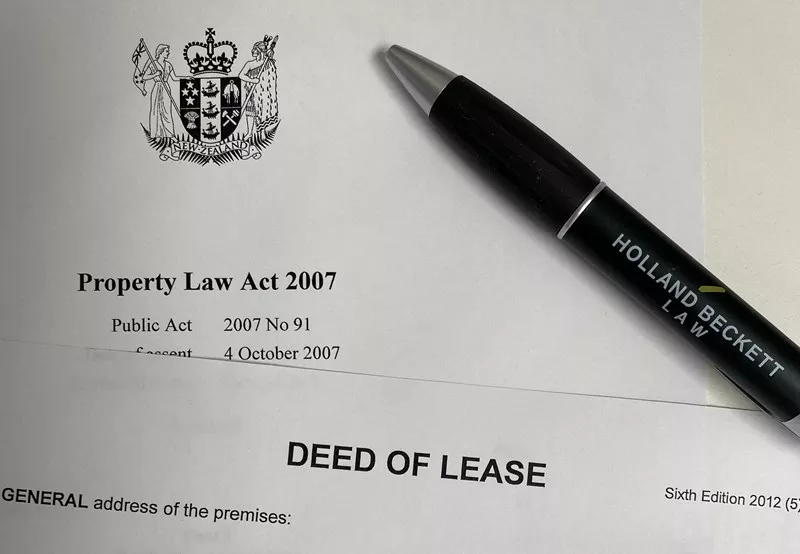The Property Law Act 2007 (Act) provides a “code” governing the cancellation of a lease by the lessor (Landlord) for breach of covenant or condition by the lessee (Tenant). The “code” is contained in sections 244 to 264 of the Act (Cancellation Code).
The codification of the lease cancellation provisions of the Act means that, on breach of a covenant or condition by the Tenant, the Landlord may only cancel a lease in compliance with the requirements of the Cancellation Code. Landlords and Tenants cannot contract out of the Cancellation Code. Any Lease containing terms which are inconsistent with the Cancellation Code, or which attempt to avoid the provisions of the Cancellation Code, are ineffective and unenforceable.
The Cancellation Code provisions of the Act must be strictly followed if a lease cancellation is to be deemed lawful. A Landlord who fails to follow the statutory procedure when cancelling a lease is exposed to the risk that the Tenant challenges the cancellation and seeks relief against the Landlord.
In this article we summarise the statutory notice requirements contained within the Cancellation Code. These requirements must be complied with by the Landlord when exercising a right to cancel a lease for breach by the Tenant.
When a Landlord’s right to cancel may be exercised
In the event of a breach of the lease provisions by the Tenant, the Landlord may exercise a right to cancel a lease by:
- applying to the court for a possession order of the land; or
- re-entering the premises peaceably and without committing forcible entry under section 91 of the Crimes Act 1961.
However, before exercising a right to cancel, the Landlord must first comply with the Cancellation Code.
Section 245 – Cancellation of lease for breach of covenant to pay rent
If the Tenant is in breach of their obligation to pay rent then the Landlord may exercise a right to cancel the lease only if:
- the rent has been in arrears for at least 10 working days;
- the Landlord has served on the Tenant a notice of intention to cancel the lease for breach of the obligation to pay rent (s245 Notice); and
- at the expiry of the notice period specified in the s245 Notice, the breach has not been remedied.
The s245 Notice must “adequately inform” the Tenant (or other recipient) of the following:
- the nature and extent of the breach;
- the amount that must be paid to remedy the breach;
- the period within which the breach must be remedied, being not less than 10 working days after the date of service of the s245 Notice (remedial period);
- the Landlord’s right to cancel the lease if the breach is not remedied within the remedial period; and
- the Tenant’s right to apply to a court for relief against cancellation of the lease and that the Tenant should seek legal advice on the exercise of that right.
“10 working days”
There are two periods of 10 working days referred to in section 245:
- the first is the period for which rent must be in arrears before the Landlord can exercise a right of cancellation for non-payment of rent; and
- the second is the minimum period that the Tenant must be given under the s245 Notice to remedy the breach.
Importantly, section 245 allows the two 10 working day periods to run concurrently.
Before exercising a right to cancel a lease under section 245, it is important that the Landlord check the specific terms of the lease. The statutory power to cancel a lease for non-payment of rent, or other breach, implied into leases by the Act requires that rent must be in arrears for at least 15 working days before the Landlord can exercise the right to cancel. However, if the lease contains an express provision entitling the Landlord to cancel the lease for non-payment of rent earlier than the implied 15 working day period, the express provision prevails. Most standard form leases specify a rent arrears period of 10 working days after the date the rent payment was due.
Section 246 – Cancellation of lease for breach of other covenants
If the Tenant is in breach of a condition or covenant in a lease other than the covenant to pay rent, for example failing to adequately maintain the premises or remove rubbish, the Landlord may exercise a right to cancel the lease only if:
- the Landlord has served on the Tenant a notice of intention to cancel the lease for breach (s246 Notice); and
- at the expiry of a period that is “reasonable in the circumstances”, the breach has not been remedied.
The s246 Notice must “adequately inform” the Tenant of the following:
- the nature and extent of the breach;
- if the Landlord considers the breach is capable of remedy by the Tenant doing or stopping doing a particular thing, or by the Tenant paying the Landlord reasonable compensation, or both:
– the thing the Tenant must do or stop doing; or
– the amount of compensation the Landlord considers reasonable;
- the Landlord’s right to cancel the lease if the breach is not remedied within the expiry of a period that is “reasonable in the circumstances”;
- that certain defects in the s246 Notice do not invalidate the notice; and
- the Tenant’s the right to apply to a court for relief against cancellation of the lease, and that the Tenant should seek legal advice on the exercise of that right.
“Reasonable in the circumstances”
The s246 Notice must give the Tenant a period of time that is “reasonable in the circumstances” to remedy the breach. However, the Cancellation Code does not require the Landlord to specify in the notice what that period will be. To give certainty to both parties, we recommend a date be specified in the s246 Notice.
What constitutes a reasonable period of time will depend on the circumstances of the matter and the ‘thing’ that the Tenant must do, or stop doing, to remedy the breach. Because of the potential ambiguity around what a reasonable period will be – what one party considers reasonable may not necessarily be considered reasonable by another – we recommend careful consideration be given to each matter and its specific circumstances. We can provide case-specific advice in this regard.
“Adequately inform”
Both sections 245 and 246 require that any notice given by a Landlord to a Tenant must “adequately inform” the Tenant of what the breach is, how the breach can be remedied (if at all) and, in respect of an s245 Notice, the date by which the breach must be remedied. The primary purpose is to give the Tenant an opportunity to remedy the breach and to put the Tenant on notice that, if the breach is not remedied, the lease will be cancelled.
Care must be taken in preparing an s245 or s246 Notice to ensure that the notice is compliant with the Act and accordingly can be acted on immediately, if required, without the need for further notice or time to be given.
Service
As the Landlord’s right to cancel a lease for breach stems from the provision and expiry, without remedy, of an s245 or s246 Notice, it is imperative that any notice is effectively and validly served on the Tenant (and other relevant persons/parties if required), in compliance with the provisions of the Act.
Failure to adequately serve a notice could result in the notice being unenforceable, or open to challenge by the Tenant, meaning wasted time and costs for the Landlord. We can provide advice on, and arrange for service of, s245 or s246 Notices to ensure compliance with the Act.
Any notice issued under sections 245 or 246 of the Act must comply with the Cancellation Code, the notice must be correctly drafted and adequately served. A prudent Landlord should strictly comply with this ‘first step’ to ensure the swift and effective cancellation of a lease in order to save time and costs, and to minimise any loss going forward.
We can provide advice in all areas of the Property Law Act and the Cancellation Code.








